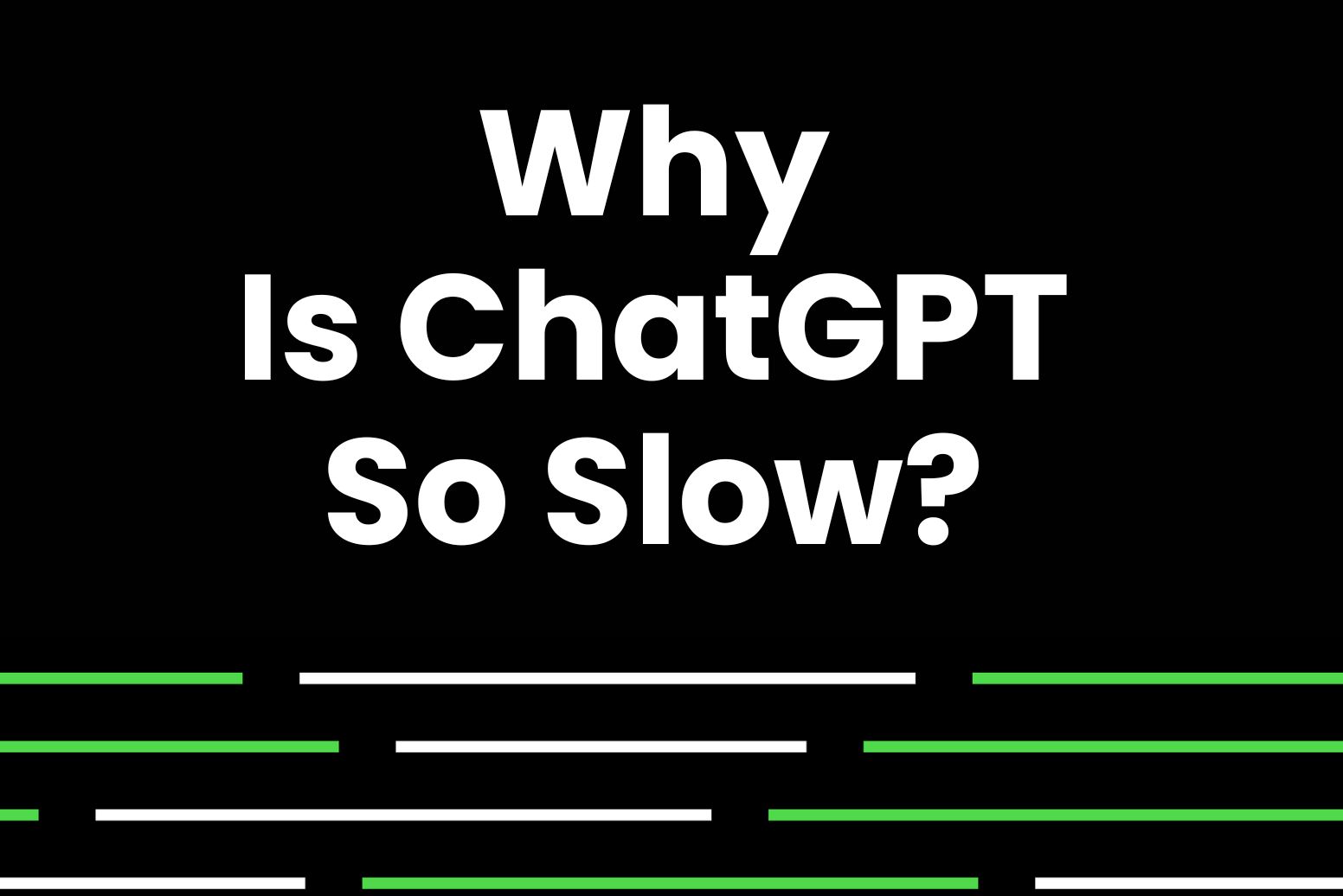ChatGPT can be slow due to high server demand or extensive processing for complex queries. This affects response times.
ChatGPT, powered by OpenAI, has gained immense popularity, leading to increased usage. High server demand often causes slower response times, especially during peak hours. Complex queries also require more processing power, further slowing down responses. Users may experience delays, which can be frustrating.
OpenAI continuously works to enhance server capacity and optimize algorithms. This aims to improve user experience and reduce latency. Understanding these factors helps manage expectations when using ChatGPT. Users should be aware of potential slowdowns during high-traffic periods. Efficient use and patience can enhance interaction with this powerful AI tool.

Quick Navigation
Server Load
Understanding why ChatGPT is slow involves examining the concept of server load. Server load refers to the demand placed on servers hosting ChatGPT. When the server load is high, response times can slow down significantly.
High Traffic
High traffic occurs when many users access ChatGPT simultaneously. The servers handle multiple requests, which increases the load. This high demand can cause delays and slower response times.
Consider peak hours, when more people use the service. The servers work harder, and the system can become slow. The impact is noticeable, especially during global events or popular times of the day.
Server Maintenance
Server maintenance is essential to keep systems running smoothly. During maintenance, servers undergo updates and repairs. These activities can affect performance temporarily.
Scheduled maintenance ensures the servers stay secure and efficient. While necessary, it can cause temporary slowdowns. Users may experience delays during these periods.
Unscheduled maintenance can also occur due to unexpected issues. This can further impact server load and performance.
Network Latency
Network latency is a common reason why ChatGPT might feel slow. It refers to the delay before data begins to transfer from one point to another. This lag can affect the performance of ChatGPT, making responses seem delayed.
Internet Speed
Internet speed plays a crucial role in network latency. Faster internet speeds reduce the time it takes for data to travel. Slow internet speeds increase this time, causing noticeable lags.
Here is a simple table to understand the impact:
| Internet Speed | Latency |
|---|---|
| Fast | Low |
| Slow | High |
Geographical Distance
The distance between your location and the server also affects latency. The farther you are from the server, the longer it takes for data to travel. This increases the delay in receiving responses.
Consider these points:
- Local Server: Faster response time
- Remote Server: Slower response time
In summary, network latency due to internet speed and geographical distance can slow down ChatGPT. Ensuring a fast internet connection and minimizing distance to the server can help improve response times.
Complex Queries
One of the primary reasons why ChatGPT might seem slow is due to the nature of complex queries. These are intricate questions or commands that require detailed, multi-step processing. Let’s break down the factors contributing to the slower response times.
Processing Time
When ChatGPT receives a complex query, it needs extra time to process the information. This involves:
- Understanding the context of the query
- Breaking down the query into smaller tasks
- Generating a coherent and accurate response
Each of these steps demands computational power and time. As a result, complex queries take longer to resolve compared to simple ones.
Resource Allocation
ChatGPT relies on a network of servers and computational resources. For complex queries, more resources are necessary:
| Resource Type | Demand |
|---|---|
| CPU | High |
| Memory | High |
| Data Transfer | Moderate |
Allocating these resources efficiently ensures that ChatGPT can handle complex queries. This process might cause a delay in response time.

System Limitations
Understanding why ChatGPT might be slow is crucial. One significant factor is system limitations. These limitations can be categorized into two main areas: hardware constraints and software bottlenecks.
Hardware Constraints
ChatGPT requires powerful servers. These servers need significant processing power. They also need a lot of memory. This is to handle complex computations. If the hardware is not up to the mark, the system slows down.
The table below shows common hardware constraints:
| Hardware Component | Impact on Speed |
|---|---|
| CPU | Handles multiple requests. Limited CPU slows down tasks. |
| RAM | Stores temporary data. Insufficient RAM causes delays. |
| GPU | Processes large data. Weak GPU affects performance. |
Software Bottlenecks
Software also plays a critical role. ChatGPT uses complex algorithms. These algorithms need to be optimized. Poorly optimized code can slow down the system.
Here are some common software bottlenecks:
- Algorithm Complexity: Complex algorithms take more time to execute.
- Code Efficiency: Inefficient code consumes more resources.
- Database Access: Slow database queries delay responses.
Addressing these bottlenecks can improve speed. Always ensure the software is well-optimized.
Optimization Challenges
Many users often wonder why ChatGPT can be slow at times. The answer lies in various optimization challenges that developers face. These challenges affect the speed and efficiency of ChatGPT. Below, we delve into some of the key aspects of these optimization challenges.
Algorithm Efficiency
The core of ChatGPT relies on complex algorithms. These algorithms process huge amounts of data to generate responses. Improving algorithm efficiency is crucial for speeding up ChatGPT. However, this task is easier said than done.
To make the algorithms faster, developers need to:
- Optimize the code
- Reduce computational overhead
- Minimize latency in data processing
Each of these tasks requires significant effort and resources. As a result, achieving optimal algorithm efficiency can be a lengthy process.
Scalability Issues
ChatGPT serves millions of users globally. This large user base presents scalability issues. Scaling the system to handle many requests is complex.
The main scalability challenges include:
- Ensuring server capacity
- Managing network bandwidth
- Maintaining data integrity
To address these challenges, developers must invest in robust infrastructure. This includes high-performance servers and efficient load-balancing mechanisms. Only then can ChatGPT handle large-scale user demands effectively.
| Challenges | Solutions |
|---|---|
| Algorithm Efficiency | Code optimization, reducing overhead, minimizing latency |
| Scalability Issues | High-performance servers, load-balancing, efficient bandwidth management |

Frequently Asked Questions
Why Is ChatGPT Responding Slowly?
ChatGPT may be slow due to high server traffic.
How Can I Speed Up ChatGPT?
Try using ChatGPT during off-peak hours.
Is Server Load Affecting ChatGPT Speed?
Yes, a heavy server load can slow down ChatGPT.
Does My Internet Speed Impact ChatGPT?
Yes, slow internet can affect ChatGPT response time.
Are ChatGPT Updates Causing Delays?
Updates can temporarily slow down ChatGPT performance.
Can Too Many Users Make ChatGPT Slow?
Yes, a large number of users can slow ChatGPT.
Conclusion
Understanding why ChatGPT might be slow is crucial for optimizing your user experience. By managing server loads and internet speed, you can enhance performance. Stay updated with the latest advancements to ensure a smoother interaction. Implementing these tips can make your ChatGPT experience faster and more efficient.
Last Updated on November 26, 2024 by JADigital Editorial
